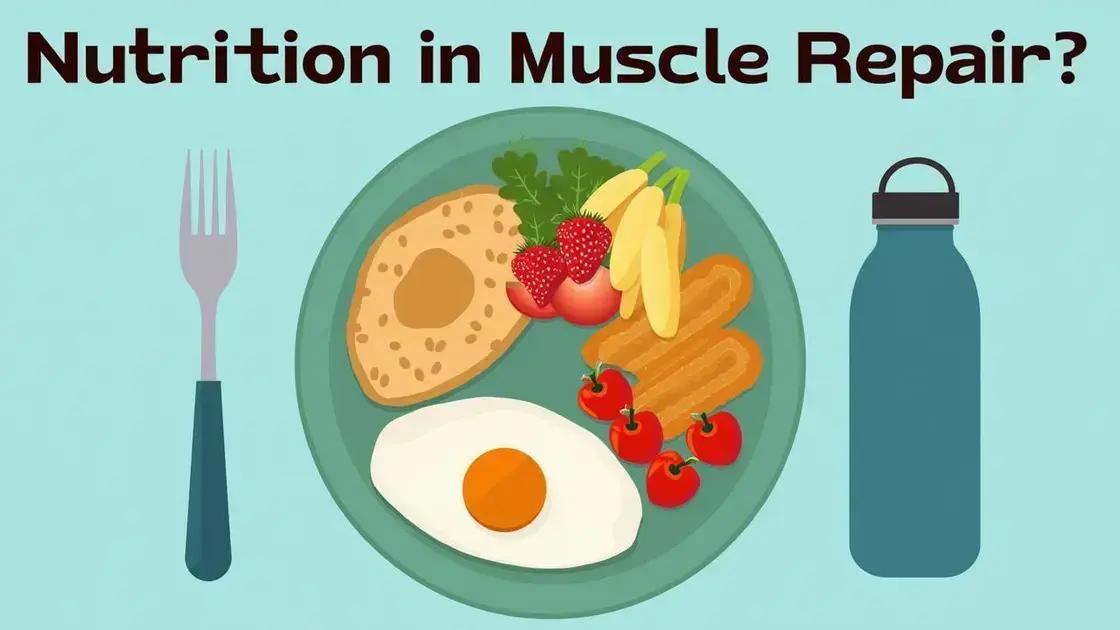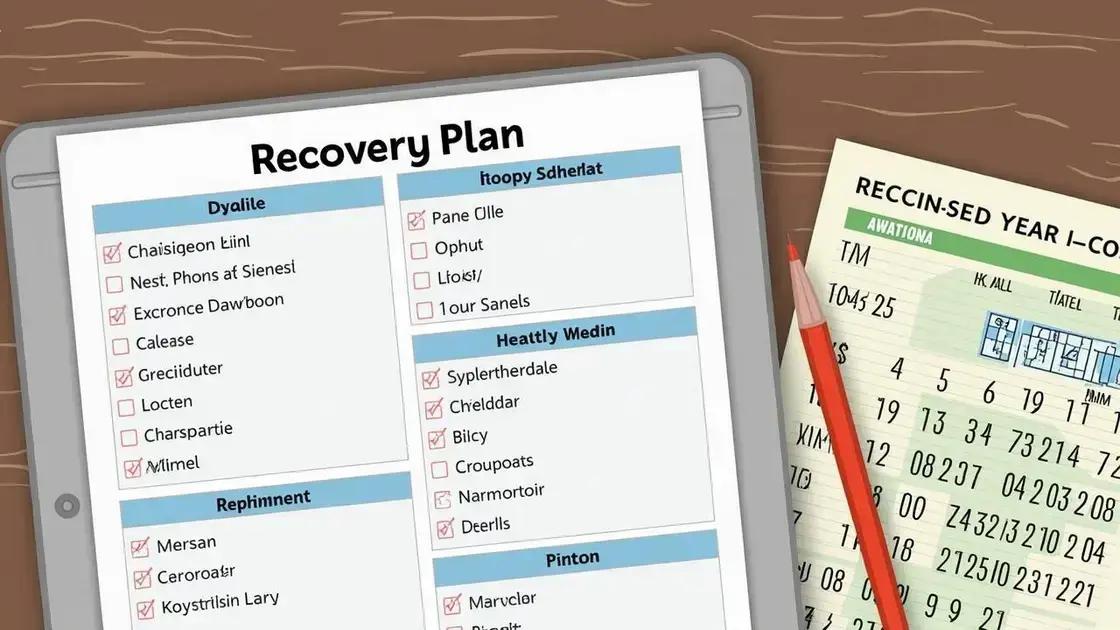To rebuild muscle strength after illness, focus on a structured recovery plan that includes setting clear goals, engaging in effective exercises, maintaining proper nutrition, and allowing adequate rest. Start with low-impact aerobic activities and strengthen gradually, ensuring to track your progress and consult with professionals when necessary for a successful recovery.
Recovering from illness can significantly impact your body, especially muscle strength. How to rebuild muscle strength after illness is a key concern for many. Engaging in targeted exercises and proper nutrition can aid your recovery journey, helping restore muscle vigor and overall health. In this article, we will delve into effective strategies, explore nutritious foods, and guide you through a personalized recovery plan.
Understanding Muscle Strength Loss

Muscle strength loss can occur for various reasons, especially after an illness that immobilizes or reduces physical activity. Understanding the underlying factors is essential to effectively regain strength.
Causes of Muscle Strength Loss
Muscle strength loss primarily happens due to disuse. When muscles are not regularly engaged, they begin to weaken. This can result from prolonged bed rest during illness, post-surgery recovery, or any condition that limits movement. Additionally, malnutrition can contribute to muscle loss. When your body doesn’t get enough nutrients, it can sacrifice muscle as a source of energy.
Impact of Aging
Aging also plays a role in muscle strength loss. As we age, muscle mass naturally declines, making recovery more challenging. This process, called sarcopenia, can be expedited by illness, making understanding muscle health even more critical.
Recognizing Symptoms
Identifying the symptoms of muscle loss is vital. You may notice difficulty in lifting objects, increased fatigue while performing daily activities, or a general decrease in your strength. If you have experienced these symptoms, it’s important to consult a healthcare professional for guidance.
Importance of Early Intervention
Addressing muscle strength loss early can lead to a quicker recovery. Engaging in a program to rebuild strength as soon as you’re able can prevent more severe impacts on your physical abilities. Recognizing the importance of rehabilitation and tailored exercise can set the foundation for regaining strength successfully.
Effective Exercises for Recovery

Engaging in effective exercises for recovery is crucial for rebuilding muscle strength after illness. Starting with gentle activities and gradually progressing can make a significant difference.
Low-Impact Aerobic Exercises
Begin with low-impact aerobic exercises such as walking, cycling, or swimming. These activities improve cardiovascular health and enhance blood flow to the muscles, promoting recovery. Start with short durations and gradually increase as you feel more comfortable.
Strength Training
Once you’re ready, incorporate strength training into your routine. Use light weights or resistance bands. Focus on major muscle groups with exercises like bicep curls, squats, and shoulder presses. Aim for two to three sessions per week, allowing rest days in between.
Flexibility and Balance Exercises
Don’t neglect flexibility and balance. Incorporate stretching exercises to maintain joint health and prevent stiffness. Activities like yoga or tai chi can enhance both flexibility and balance, improving overall body control.
Listening to Your Body
It’s important to listen to your body during recovery. Pay attention to how you feel during and after exercises. If you experience pain or extreme fatigue, scale back your activity. Modify exercises to accommodate your current abilities for a safe and effective recovery.
Nutrition for Muscle Repair

Nutrition for muscle repair is essential when recovering from illness. Proper nutrition not only helps rebuild muscle but also supports overall health.
Essential Nutrients
Focus on these essential nutrients to enhance recovery:
- Proteins: Include sources like lean meats, fish, eggs, dairy, beans, and nuts. Protein helps repair and build muscle tissue.
- Carbohydrates: Choose whole grains, fruits, and vegetables. These provide energy to fuel workouts and daily activities.
- Fats: Healthy fats, like those from avocados, olive oil, and nuts, support hormone production and overall health.
Meal Timing
Think about meal timing as well. Consume a balanced meal or snack containing protein and carbohydrates within 30 minutes post-exercise to maximize recovery.
Hydration
Staying hydrated is crucial. Drink plenty of water throughout the day, especially after workouts. This helps your body function properly and aids muscle repair.
Consulting Professionals
If you’re unsure about your dietary needs, consider consulting a nutritionist. They can create a personalized meal plan based on your specific recovery goals and nutritional requirements.
Creating a Recovery Plan

Creating a recovery plan is essential for rebuilding muscle strength after illness. A structured approach helps ensure you stay on track and achieve your goals.
Set Clear Goals
Begin by setting clear and realistic goals. Identify what you want to achieve, whether it’s regaining full strength or completing specific exercises. Make sure your goals are measurable and achievable.
Schedule Your Workouts
Create a schedule for your workouts and include different types of exercises. Plan sessions for low-impact aerobic activities, strength training, and flexibility exercises. Aim for at least 150 minutes of moderate aerobic exercise each week, along with strength training two days a week.
Include Recovery Time
Don’t forget to include recovery time in your plan. Rest days are just as important as workout days to allow your muscles to repair and grow stronger. Listen to your body and adjust your schedule when needed.
Track Your Progress
Keep a record of your workouts and nutrition to track your progress. This can motivate you and help identify areas for improvement. Adjust your plan as you grow stronger or as your goals change.
Consult a Professional
If possible, work with a healthcare provider or a fitness professional to refine your recovery plan. They can provide guidance tailored to your specific needs, ensuring safe and effective recovery.
Recovering Muscle Strength: A Journey to Wellness
Rebuilding muscle strength after illness is a vital journey that involves understanding muscle loss, engaging in effective rehabilitation exercises, and focusing on proper nutrition.
By creating a comprehensive recovery plan, setting clear goals, and tracking your progress, you can ensure that you are on the right path to regain your strength. Remember to listen to your body and consult professionals when needed.
Embrace this recovery journey as an opportunity to enhance your overall health and well-being, allowing you to return to daily activities and enjoy life to the fullest.
FAQ – Frequently Asked Questions about Rebuilding Muscle Strength After Illness
What are the first steps to rebuilding muscle strength after an illness?
Start by consulting with a healthcare professional. Engage in gentle exercises and gradually incorporate strength training as your body allows.
How important is nutrition in the recovery process?
Nutrition plays a vital role. Focus on a balanced diet rich in proteins, carbohydrates, and healthy fats to support muscle repair.
What types of exercises should I include in my recovery plan?
Include low-impact aerobic exercises, strength training with light weights or resistance bands, and flexibility exercises like stretching or yoga.
How do I know if I’m progressing in my recovery?
Track your workouts and nutrition. Noticing improvements in strength, energy levels, and endurance indicates progress.
Can I recover muscle strength without professional help?
While you can start on your own, consulting with a fitness professional or physical therapist can provide personalized guidance and ensure safety.
Why is rest important in rebuilding muscle strength?
Rest days are crucial for muscle recovery. They allow your muscles to repair and grow stronger after exercise.













